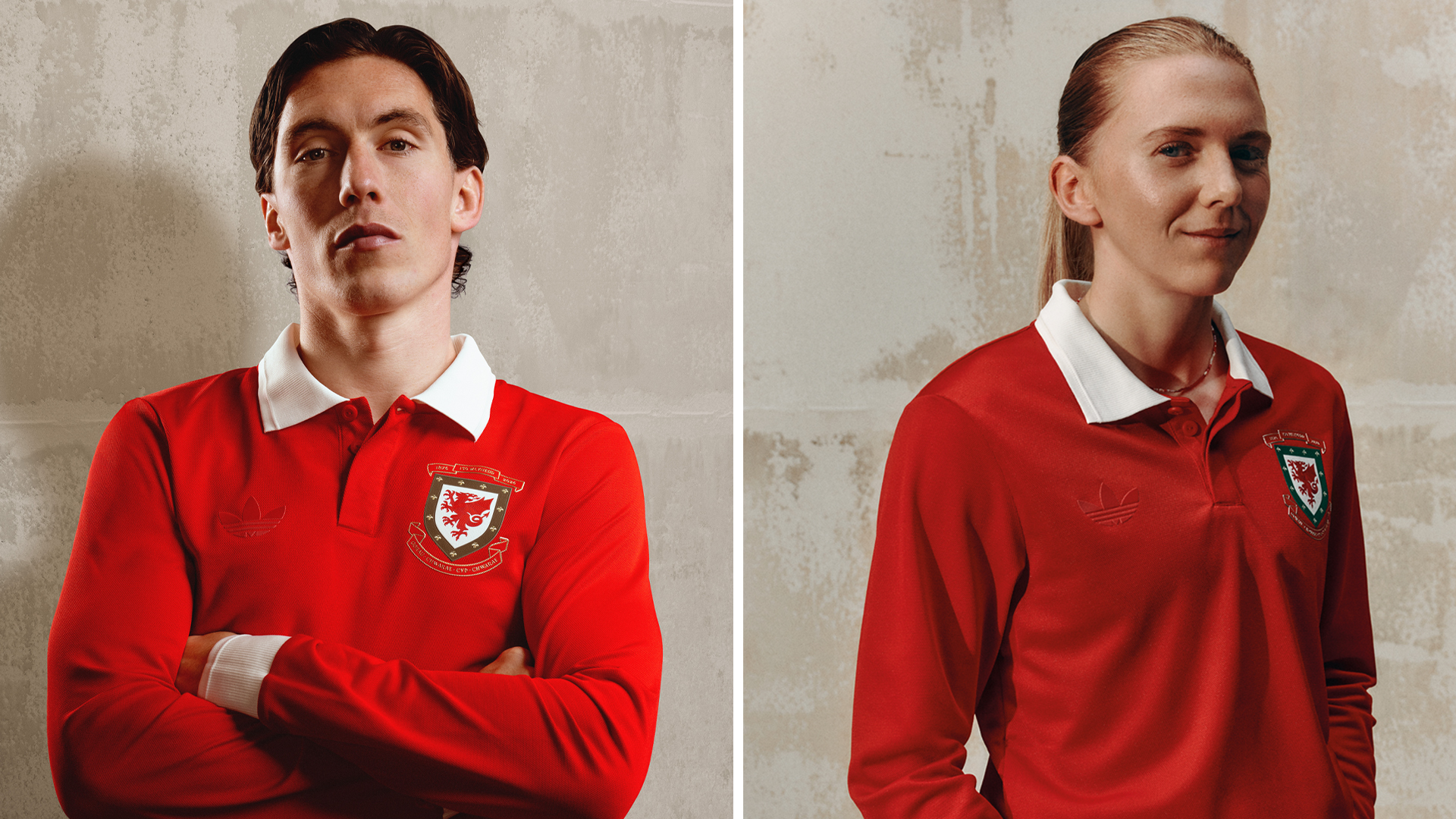Power, corruption & lies in Bucharest: Why Steaua vs Dinamo is more than a game
In November 2002, FourFourTwo sent Jonathan Wilson to assess Dinamo and Steaua Bucharest: two Romanian giants determined to destroy each other
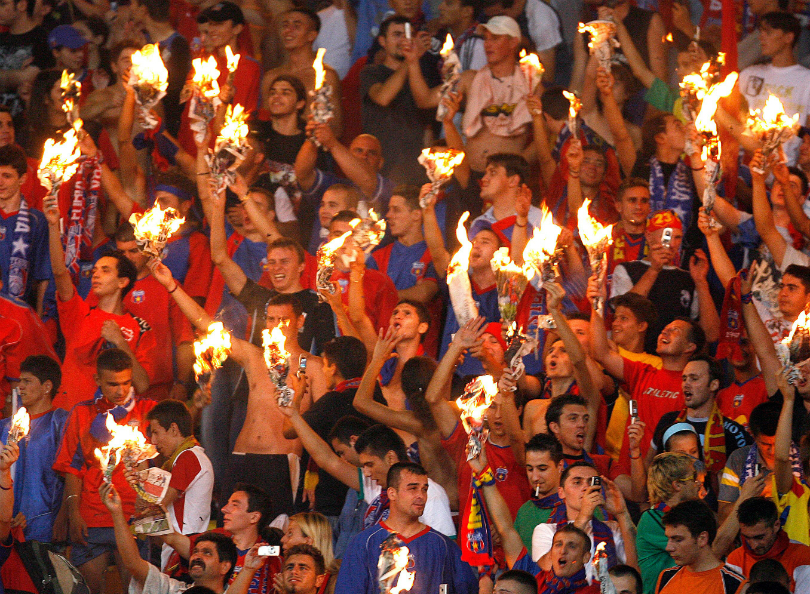
Though Steaua had all but wrapped up the title, 2001’s Bucharest derby was nonetheless played out in the proverbial cauldron of hate.
The stands at the Dinamo Stadium were packed to overflowing, the stairwells crammed, and firemen spent the entire game dousing flares hurled from the tribunes. In the end, they turned their hoses on the perpetrators, who, despite the raw April damp, stood defiant, clinging to the security fencing and hurling insults.
When Dinamo nicked the winner 10 minutes from time, there was a near riot. The red-and-white half of the city writhed in celebration. Meanwhile, those in the red-and-blue half pointed out that they were going to win the league anyway.
This year, with the two clubs apparently locked in an embrace of mutual destruction, the game has been scheduled for 9pm, just to make sure fans have time to get well and truly mullered by kick-off.
A derby destroying a country
Waiting for the train from Craiova that morning, FourFourTwo flicked through a Romanian sports paper, trying to make sense of a preview of the game. Your reporter's Romanian is limited, but the line comparing the derby to ‘Lewis-Tyson, Barcelona-Real Madrid, Schumacher-Schumacher’ needs little explanation.
A tracksuited figure – an off-duty croupier called Ascamio – asked for a light. Ascamio is a Universitate Craiova fan, but he, like most Romanians will be watching the derby: “They are great clubs,” he says, “but they hate each other. Their hate is consuming them, and they are destroying each other: that is why National might win the league.”
The best features, fun and footballing quizzes, straight to your inbox every week.
They are great clubs, but they hate each other. Their hate is consuming them, and they are destroying each other
Since 1982, only Craiova in 1989 and Rapid in 1999 have broken the Dinamo-Steaua duopoly. National have never won the title. “Victory for them,” Ascamio says, “would show that you do not need money to win. It would show that the days of corruption are over.” With average gates of around 2,000, National simply couldn’t bribe their way to the title, as Steaua, Dinamo and Rapid have all been accused of doing.
Riddled with coincidence and paranoia, Romanian football is sport as written by Thomas Pynchon. Conspiracy theories abound to such an extent that it seems there can be no such thing as a genuine cup upset or last-minute groin strain. The day before the derby, National only manage a draw at home against Sportul Studentesc.
Immediately there are suggestions that the fixers have been in, that Dinamo have paid off National. Yet the truth is that National just had one of those days, twice hitting the woodwork. The result leaves Dinamo needing a win to return to the top, with just three games remaining.
Crisis is an overused word in football, but the derby game is a meeting of two crisis clubs in a country that has, over the past decade, redefined the word crisis. The pair are seemingly intent on destroying each other, and Romanian football is in danger of going down with them.
There may have been a golden period without scandal between the overthrow of dictator Nicolae Ceauseseu in December 1989 and the hijacking of the game by mafia interests, but few seem able to remember it.
It's an open secret that Romanian football is dominated by the Co-operativa, a dozen clubs who exchange home wins in order to ensure that none of them are ever relegated
Under Ceausescu, the political will was everything; now, nothing matters but money. Corruption is endemic. For the best part of a decade, it has been an open secret that Romanian football is dominated by the Co-operativa, a collection of around a dozen clubs who exchange home wins in order to ensure that none of them are ever relegated.
Only when they are assured of their First Division status do they get round to deciding who wins the league and who qualifies for Europe. Indeed, it has become so pointless for teams from outside the Co-operativa to try to compete in the top eight that last season Baia Mare, after winning promotion from Division Two, sold their First Division status back to relegated Bacau.
A foggy history
After Gheorghe Hagi, Laszlo Boloni is the most capped footballer in Romanian history. Having virtually assured that Romania would finish second behind Italy in their World Cup qualifying group, and thus clinching a play-off spot, he quit as coach of the national team in June last year to take charge of Sporting in Portugal.
It is very sad, but the truth is that many people in Romania are very poor. Romanian football is also very poor – so perhaps there is corruption
“If you walk through Bucharest, you will see many bad things,” he says. “It is very sad, but the truth is that many people in Romania are very poor. Romanian football is also very poor – so perhaps there is corruption.
"When I was national coach, if I had found that one of my players was involved in the corruption, I would have expelled him from the side; but it is almost impossible to find out.”
Proof has always been the problem. Senior internationals such as Hagi and brother-in-law Gheorghe Popescu have made repeated calls for the Romanian Football Federation (FRP) to clean up the game; journalists for Prosponf and the Gazeta Sporturilor then make their accusations; but FRF president Mircea Sandu just wrings his hands, mumbling about lack of evidence and quietly forgets the whole thing.
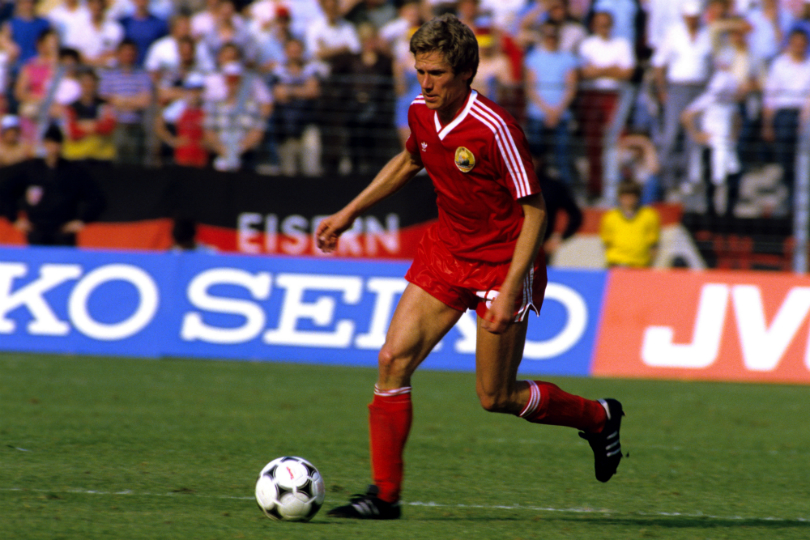
For years Romanian football plodded on, sinking deeper and deeper into the mire until, last November, balding Slovenia forward Milan Osterc knocked them out of the World Cup with a mis-hit cross that sailed over Bogdan Stelea and dropped into the far corner. An accidental hero if ever there was one, the unassuming Osterc became an overnight star in his homeland but his most lasting impact may prove to be in the country a few hundred miles further east.
NEXT: "We will shoot corruption dead. This is a war"
The ostrich jerked its head from the sand, and decided, at last, that drastic action was necessary. After three successive appearances at the World Cup finals, Prime Minister Adrian Nastase was appalled, and instructed Sports Minister Georgiu Gingaras to sort things out.
He initiated a police probe into the finances of every top-flight club, and pledged the biggest investigation into corruption in Romanian football since 1980, when 130 referees and 40 players and officials were charged with match-fixing.
From the spring we will shoot corruption dead. This is a war. There is no alternative if we really want to stop the corruption
At the same time Sandu was elected – unopposed – for a fourth term as president of the FRF, and vowed to expunge match-fixing from Romania before he stands down in 2006 – probably to be replaced by Popescu. “From the spring we will shoot corruption dead,” he said. “This is a war. There is no alternative if we really want to stop the corruption."
Club presidents smirked; they had heard all this before. But Sandu was adamant. “We will not await any proof," he said. “A fixed game can be seen with the naked eye, and we will punish those who are throwing mud against the cheek of our game.”
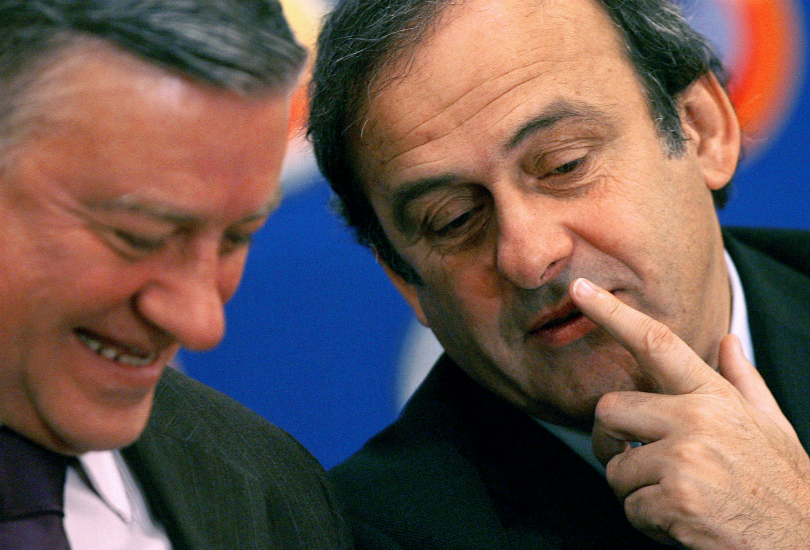
And they didn’t await any proof when they docked Dinamo and Ceahlaul Piatra Neamt three points each for' allegedly fixing Dinamo’s 2-1 win on the opening day of the spring half of the season. The week before the game, Steaua coach Victor Piturca claimed that a Dinamo victory had been agreed as part of the transfer deal that took striker Costel Ilie to Bucharest over the winter break.
[A Dinamo victory] will be fixed. It will be a huge scandal. Normally it would be a very open game, and any result would be possible, but everything that people are saying about it not being a fair game will come true.
“It will be fixed,” he said. “It will be a huge scandal. Normally it would be a very open game, and any result would be possible, but everything that people are saying about it not being a fair game will come true. I don’t want to accuse Dinamo, but the only game I have seen them play this season was their 2-1 win over Gloria Bistrita, which was very strange.”
The allegations didn’t surprise many in Romania. Ceahlaul owner Gheorghe Stefan has long been fingered by the Romanian press as one of the leaders of the Co-operativa, and UEFA banned him from European competition for a year after an attempt to bribe French referee Stefan Moulin with four prostitutes ahead of an InterToto Cup quarter-final against Austria Vienna in July 2000.
Penis-waggling rivals
Equally, Piturca attacking Dinamo is nothing new; Steaua and Dinamo have always been the fiercest of rivals, but things have got worse since the agent Giovanni Becali began working with Dinamo last season.
Dinamo were historically the team of the Securitate, the despised secret police, and attracted few fans from outside the service. Hatred of them drove many to support Steaua, even though they were the side of the army and, worse still, numbered the Ceausescu family among their supporters.
The rivalry came to a head in the 1988 cup final. As the game headed into injury time with the scores locked at 1-1, a blatantly offside Gavrila Balint put the ball in the Dinamo net. The referee signalled offside, whereupon Steaua stormed off the pitch.
“The players came off the pitch but it was the coach that ordered them off, not me,” then Steaua president Valentin Ceausescu – former dictator Nicolae’s son – explains. “My father was sat next to me and he asked me who won. I didn’t know myself.”
Dinamo defender loan Andone whipped out his penis and waved it in protest at the Communist Party box
Dinamo defender loan Andone, who would go on to play a major part in the 1990 World Cup finals, whipped out his penis and waved it in protest at the Communist Party box. The game was abandoned, and Dinamo declared the winners.
“Dinamo were then presented with the trophy so I went into their changing room to congratulate them,” Ceausescu continues. “The Dinamo coach just shouted at me, ‘You don’t decide the result’, threw the trophy at me and told me to leave.”
An investigation was launched the following day, after which Communist Party officials awarded the match to Steaua, and suspended Andone for a year (a sentence commuted to allow him to prepare for the World Cup). “I didn’t care who won because it all seemed so ridiculous,” Ceausescu claims. After the Revolution, Steaua renounced the trophy.
Players of the time revere Ceausescu. “Valentin was the best manager I ever worked for,” says Boloni. “He gave the team exactly what they needed, but when people work, they make mistakes. That was one of only a couple of mistakes he made in his career, but because his name is Ceausescu, people forget all the good things he did.”
An icon emerges - and splits the national team
In that Steaua side were Piturca and Hagi, sewing the seeds of a dispute that would still be raging 14 years later. When Steaua beat Barcelona on penalties in the European Cup final of 1986, Piturca was arguably their great star, certainly their leading goalscorer. Steaua won the Romanian title that year, but Piturca missed out on the top scorers’ title by one to a 19-year-old Hagi, then at Sportul Studentesc.
There were rumours that Piturca was jealous, and it hardly helped that the following year, he led the goalscoring charts by one going into the last game of the season, only for Hagi to notch an unlikely six to take the crown
Hagi joined Steaua on a one-match loan for the Super Cup final against Dynamo Kyiv later that year, but, after scoring the winner, never went back. Suddenly Piturca’s team was Hagi’s team, and Anghel Iordanescu, who replaced Emerich Jenei as coach that summer, built his team around the effervescent young star.
There were rumours that Piturca was jealous, and it hardly helped that the following year, he led the goalscoring charts by one going into the last game of the season, only for Hagi to notch an unlikely six to take the crown.
In 2000, matters came to a head. As national coach, Piturca led a Romania side that included Hagi to the finals of Euro 2000. Quite reasonably, he insisted that players who had played in all the qualification games should receive larger bonuses than those – Hagi among them – who had missed the crucial away win over Portugal. Hagi kicked up a fuss, Piturca refused to back down, and, having committed Romania’s ultimate sin – offending Hagi – was sacked.
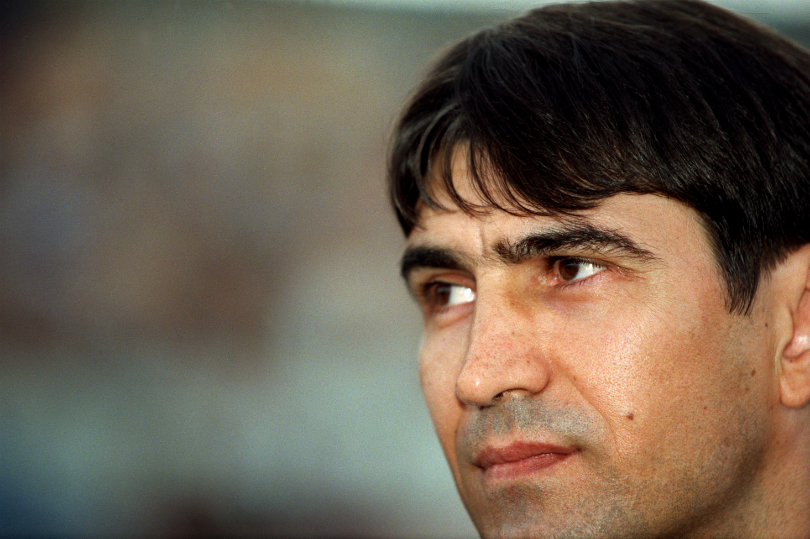
A sorry enough tale, but questions began to be asked. Why would Hagi, by then hugely rich, quibble over a sum that can have meant little to him? Such pettiness was wholly out of character in a man noted for his generosity. Was Hagi put up to destabilising Piturca by somebody with a deeper agenda, somebody like his agent, Giovanni Becali?
Becali is the biggest agent in Romania; if a Romanian plays abroad, the chances are he has been placed there by Becali. But in Romania everybody has a history, and Becali’s is murkier than most.
Becali and Albanu were also huge football fans, following Romania whenever they played away. He became well-known to the players, and was perfectly placed to become an agent once the markets opened up after the Revolution
Prior to becoming an agent in 1990, he is accused of having carried out various scams and robberies in western Europe with another Romanian, Dan Albanu, who died in a car crash in Italy in 1990. Becali met his wife, a Colombian, when she was a student at the Sorbonne in Paris, claiming falsely that he was also studying there.
Becali and Albanu were also huge football fans, following Romania whenever they played away. He became well-known to the players, and was perfectly placed to become an agent once the markets opened up after the Revolution. His company, International Sports Management, acted for a number of high-profile figures, among them Hagi, Popescu and Stelea. Until 1999, he was also a firm friend of Piturca.
What happened that autumn is far from clear, but suddenly Becali and Piturca became sworn enemies. Becali, not one to bear a grudge lightly, set out for revenge. After Piturca was deposed as Romania coach, he took charge at Steaua. Becali promptly proclaimed himself a Dinamo fan and initiated the spending spree that took, among others, Ovidiu Stinga, Florin Pirvu, Bogdan Lobont and Dorin Semeghin to the club.
In Romania, though, there are always wheels within wheels: Giovanni Becali’s cousin, Gigi Becali, is the majority shareholder of Steaua. Giovanni and Gigi do not get on. And, just to make things even more complex, Gigi and Hagi were once so close that Hagi served as best man at Gigi’s wedding. Not any more.
NEXT: "They won a title, but we all know how that came about"
Becali vs Becali
Romanian football is split into two camps: on the one side Steaua, Piturca and Gigi Becali; on the other, Dinamo, Hagi and Giovanni Becali. Hagi, though, is a Steaua legend, and has made little effort to hide the fact he would love to replace Piturca as Steaua coach. That, of course would give Giovanni Becali a controlling interest in both of Romania’s biggest clubs.
Hagi, though, is a Steaua legend, and has made little effort to hide the fact he would love to replace Piturca as Steaua coach. That, of course would give Giovanni Becali a controlling interest in both of Romania’s biggest clubs
Hagi has regularly attacked Gigi Becali, Piturca and the other major investor, Viorel Paunescu. “They won a title, but we all know how that came about; in Europe they did nothing,” he said. “Steaua is a coat of arms, a team honoured throughout Europe and three men like that cannot simply turn up, invest a few dollars and think the club is theirs.”
As Steaua’s form slipped after Christmas and fans called for Piturca’s head, Hagi stepped up his attack, particularly after a goalless draw with National, who were reduced to 10 men 30 minutes from time. “Even when they have an extra man, Steaua cannot win these days,” he said. “The team is nothing, and the fans are upset, so they are calling for the coach and the directors to resign. Fans all over the world do that if they are angry with the performances of the team.
"It’s a democratic means of expressing an opinion and it must be respected. But what I saw against National when the crowd started whistling and jeering was only amazing. I saw fans being beaten by Gigi Becali’s men. How can you beat a fan because he doesn’t like how his team plays?
"In the Bernabeu, if 100,000 fans were waving their white handkerchiefs to protest about the performance of the team, can you believe that the Real Madrid president Florentino Perez would send in gorillas to beat up fans because the coach Vicente del Bosque doesn’t like to see the fans criticising him or the players?”
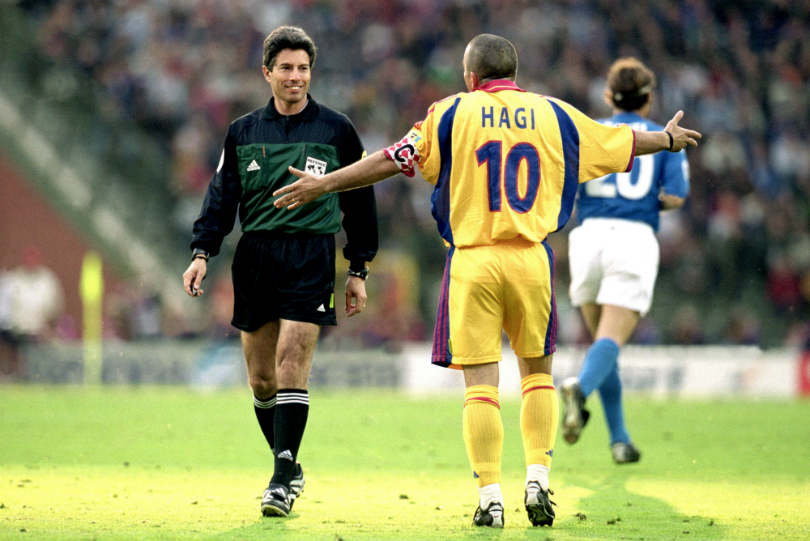
Steaua, of course, deny the claims. “Unfortunately the long time he has spent abroad has not served to make Hagi any more intelligent. What he has said just isn’t true,” says Viorel Paunescu. “I don’t understand where this attitude against me has come from,” adds Gigi Becali. “He is godfather to my children, but that doesn’t stop him having something against me. I still love him, because I understand that he is just a weapon in the hands of others.
Maybe nobody else will ever be born with his talent, but it seems born with his talent, but it seems now that he wants to be president of the country, run all of football and have people look at him as God. But the only place he can ever beat me is on the football field. It would have been better if he had stayed out of the storm and held onto his crown as the king of football. I will not be evicted from Steaua, not by 100 Hagi’s or by NATO troops.”
Amid all the back-biting, the form of both sides suffered. Dinamo went on a run of one win in seven games, although they at least had the points they were docked restored for lack of hard evidence of bribery. Meanwhile Steaua did little to appease their fans by taking just four points from six home games.
Referees are doing what they’ve been asked by their boss. I used to think [refs' chief] Grigorescu was an honourable man; I would never have believed he was such a good actor
In Romania, of course, there is no such thing as poor form. Gigi Becali blames the head of the Romanian Referees Committee, Nicolae Grigorescu, who he says has had it in for him since he refused to lend him £7,000 one night in a casino.
“Referees are doing what they’ve been asked by their boss,” he claims. “I used to think Grigorescu was an honourable man; I would never have believed he was such a good actor. Maybe he missed his calling by becoming a referee.” Grigorescu dismisses the accusation.
Piturca, meanwhile, blamed those players in his squad who belong to Giovanni Becali’s agency, and promptly dropped defenders Iulian Min and Valeriu Bordeanu and striker Ionel Danciulescu when they signed up with ISM. “They are traitors,” he says. "They don’t love Steaua.”
As his brother Gigi puts it: “Giovanni wants to ruin Steaua and make it easy for Dinamo to win the title. Anybody on his books is for Dinamo and against Steaua. He says he just wants to help players move abroad, but that is a lie. I know of players who have refused to sign for Steaua because Giovanni wants them to sign for him.”
Danciulescu drove his jeep off a bridge into the River Dimbovita. Luckily, the vehicle landed the right way up, and Danciulescu swam away with minor injuries
Ostracised by Steaua, Ionel Danciulescu decided to return to Dinamo, the club he left in acrimonious circumstances in 1998. Dinamo fans have refused to welcome him back, and, in April, returning to Bucharest after being given a torrid time away at Bacau, Danciulescu drove his jeep off a bridge into the River Dimbovita. Luckily, the vehicle landed the right way up, and Danciulescu swam away with minor injuries.
“I was exhausted because of the fans’ attitude towards me,” he explained. “My morale was down, so maybe that is why I was driving so fast.” Reports later quoted hospital staff claiming he was drunk, and that someone had given a urine sample on his behalf.
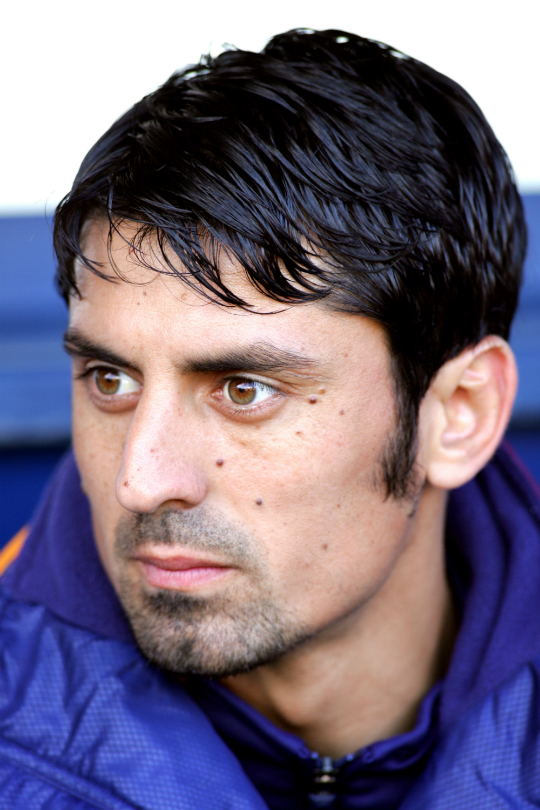
And so to the match
As Danciulescu takes the field to warm up ahead of the derby, both sets of fans break off from their mutual abuse to boo him. The evening is sultry; distant lightning flickers in a sky dappled in sulphurous orange and purple. The scene is set for a tempestuous affair, and tempestuous it proves to be.
The visitors take the lead on three minutes. Steaua keeper Martin Tudor fists away a corner, but as he is bundled into the back of the net by Claudiu Niculescu, Vlad Munteanu pokes the loose ball home.
It takes Steaua just 12 minutes to draw level, Catalin Lita skipping through four challenges to tee up the equaliser for Claudiu Raducanu. But within a minute Dinamo are back in front, Bogdan Onut calmly knocking the ball home after being left in acres of space at the back post from a free-kick.
“Championes,” chant the Dinamo fans, spinning their scarves above their heads as their side looks to increase the lead. Steaua’s frustration leads to fractiousness on the pitch, and their fans’ indifference off it. They are hot, disillusioned and plain fed up.
Steaua's Pompiliou Stoica and Dinamo's Giani Kirita are both sent off in the last 10 minutes to add to the 10 yellow cards that have already been awarded
The bookings mount up, as do the number of horrendous challenges on Dinamo keeper Bogdan Lobont. As the second half wears on, though, the home side begin to dominate, and they have already wasted a couple of decent opportunities when substitute Marius Luca rises to nod home Florentin Dumitru's cross with 13 minutes remaining.
Steaua midfielder Pompiliou Stoica and Dinamo skipper Giani Kirita are both sent off in the last 10 minutes to add to the 10 yellow cards that have already been awarded, but Steaua hold on for the point. The fans are muted, perhaps realising that Dinamo will be happy enough with a draw.
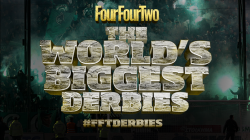
All the talk at the bar that night is of referee Cristian Balaj. Clearly, everybody is saying, he must have been bribed: Why else would he allow Dinamo’s opener? Why else deny Steaua a clear penalty in the second half? Dinamo will win the title, it's said: they will find a way.
But at first glance, Niculescu’s challenge on Tudor hadn’t looked a foul; only on TV replays did it become obvious. Equally the penalty appeal was farcical, the ball being lifted into a defensive hand from a matter of inches. FourFourTwo is dismissed as a naive foreigner; in Romania, corruption has become a way of life.
Three weeks later, National lose their last game of the season 2-1 in Craiova, while Dinamo hammer Brasov 4-0 to take the title by two points: if Dinamo’s punishment for match-fixing had not been overturned, National would have been champions. Florentin Dumitru is appalled. “The league,” he says, “has bee decided not by the players, but by the politicians.” And by money? He shrugs. “Who can say?”
This feature originally appeared in the November 2002 issue of FourFourTwo magazine. Subscribe!
 Join The Club
Join The Club





